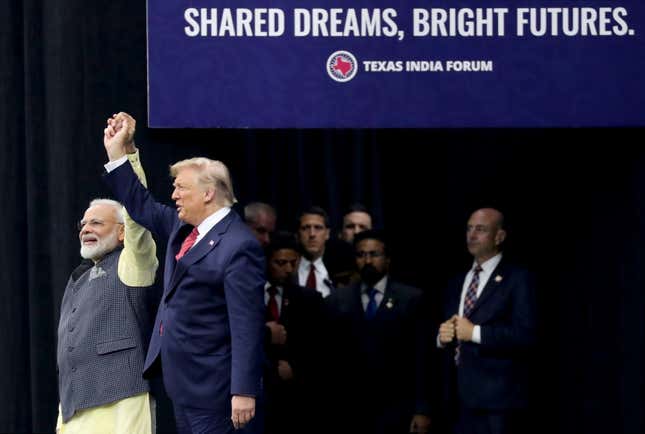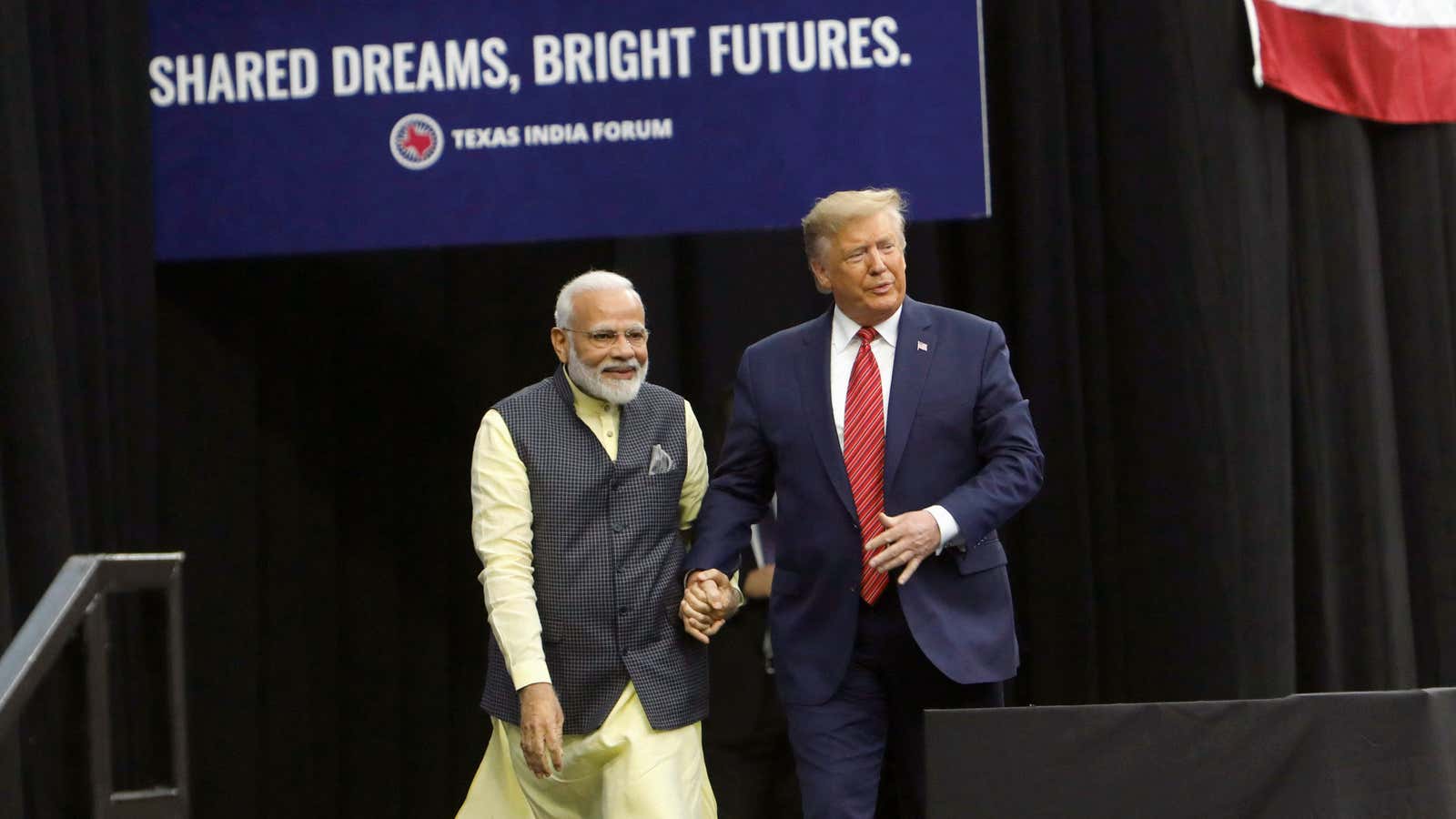Senator Kamala Devi Harris’s Indian roots may not be enough to woo Indian-American voters in the US.
Indian-Americans have traditionally supported the Democratic camp. But Indian prime minister Narendra Modi’s camaraderie with US president Donald Trump could change that during the November 2020 presidential elections, according to a paper by researchers Safiya Ghori-Ahmad and Fatima Salman for The Atlantic Council.
This, according to the writers, is a marked departure from the voting patterns of the 2016 presidential elections. Not only did the Indian-American community raise $10 million for Hillary Clinton’s campaign, but exit poll data also show that 90% of the south Asian community—a majority of which is Indian-American—voted Democratic.
“The 2016 poll numbers came from a culmination of efforts made by the Obama-Biden administration to forge an otherwise unlikely friendship with the Modi government,” write Ghori-Ahmad and Salman.
The paper notes that over the past four years, Modi and Trump’s carefully built friendship has made some Indian-American donors lean towards the Republican party. This bonhomie was particularly evident during Modi’s visit to the US in September 2019, where he headlined the “Howdy, Modi!” event in Houston. Modi and Trump spoke highly of each other, and the Indian prime minister used his own election slogan to campaign for Trump. “Abki baar, Trump sarkaar” (this time, Trump’s government) received thunderous applause from the 50,000 attendees, mostly from the Indian diaspora.
At the end of the Houston event, Modi and Trump walked out holding hands, sending out a message to the Indian-American audience about India’s relationship with the US under Trump.

This friendship was on display again in February, when the US president undertook his first state visit to India. At Namaste Trump, a gala event in Modi’s home turf Ahmedabad, Modi spoke at length about the strong ties between him and his “friend” Trump. The US president may have called Modi a tough negotiator while speaking about the India-US trade relations, but in no way did that eclipse the familial image that was being projected.
The Kashmir piece
According to The Atlantic Council’s paper, this “symbolic bonhomie” is only a part of the reason why Indian-Americans may lean towards Trump. “…the Democrats have continued to make critical remarks about the state of religious freedom in India and Kashmir more generally,” the researchers note. This does not sit well with Modi supporters in the Indian diaspora abroad.
This unease surrounding a critical view of Modi could well be soothed with Harris’s evocation of her Indian roots. “…the Indian American community is not a monolith and there are large swaths of the community that see themselves in Senator Harris’ story. Many have the same picture of sari-clad relatives as immigrants in America,” the paper notes. “And it is important to note that there is also a subset of Indian-American voters that have been increasingly critical of the policies of the BJP-led government, including sitting congressional members like Harris and representative Pramila Jayapal.”
At the Howdy, Modi! event too, several members of the Indian diaspora, protested against Modi’s policies and held up placards that were critical of his stance on religion.
Harris, for instance, has been a vocal critic of Modi’s move to revoke Article 370, which took away the special status and political autonomy of the erstwhile state of Jammu & Kashmir. Trump, on the other hand, has made several offers of mediating between India and Pakistan for the Kashmir issue, only to be rebuffed by India.
The Trump campaign, on its part, has been running targeted ads for the Indian-American community, according to the paper. “The increased attention and evolving Trump-Modi dynamics, in addition to prominent Indian American Republicans like Nikki Haley and Bobby Jindal may be contributing to an increasingly shifting Indian American political base,” it notes.
The writers of Atlantic Council’s paper say the Biden-Harris campaign will now need to account for the political situation and policies in India to win over the diaspora. “The Biden-Harris campaign should prepare itself for a demographic leaning more across the political spectrum than in 2016—with some confirming that India and Indian-related policies figure significantly into their voting decisions.”
